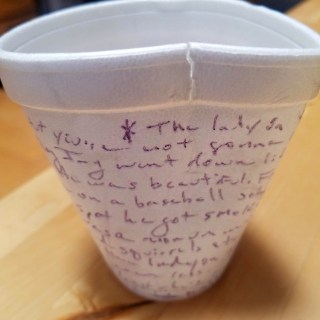
One thing I can tell you is that every Nuyorican Poet I know has an outrageous Miguel AlgarÃn story. Here is mine.
I was getting ready to plan for the one year anniversary of Acentos, our Bronx Latinx Poetry Series, and wanted to feature an iconic figure. One night I was hanging out late at the Nuyorican Poets Cafe for the open mic, which normally would start around 1am on a Friday night, when who happens to hit the stage but the founder himself, Miguel. I don’t know how exactly I got the nerve to ask him for his phone number or even how the conversation went but I got the digits. I called him up two days later to ask him to feature for Acentos. Now, if you know anything about Miguel, you know that he had one of the most distinctive voices in poetry. It was a sonic tone of full barrel chested revelry with a melodic hum in the background. No two ways about it, the man was a living djembe. So I call the number and that is the exact tone I hear saying, “Hallllloooo.” And I go, “Yes, I am calling to speak with Miguel.” And what do I get back? “Miguelllll eess not here right nooooowwww.” What? I was so flabbergasted that I actually played along, “When will Miguel be back?” Pause and then “Ohhhhh, I don’t knoooowww. Maaaayyybee later?” I say Thanks and hang up. I called back two minutes later, “Hallllloooo.” “Hi, Miguel! Great to hear your voice!” And than I was able to get him to come to feature for us.
Of course, there is a part two and part three to the story which is the case with most poet icons and getting them to feature but I will share those later. Maaaayyybee.

Oh, Miguel. In twenty years of poetry I think I have only heard a few people who use their whole body to bring a poem to life. You may be the first who I ever saw do it on stage. I am so lucky to see you do it live at 1am in NYC’s most iconic poetry venue with maybe a dozen people around. To reach that level of poesia has always given me a goal that I may never reach. I think I have done it a few times for one or two lines. I felt the poem connect in my gut, pulse out the body in one slap of reverb, and then it’s gone. But I am still chasing it.
All the while I can see your face in your classic impish pose knowing so much about la palabra y la cultura. I am building up the nerve to ask you for more and all I can hear now is “Hallllloooo.” “Yes, I wish to speak with Miguel.” And what do I get back? “Miguelllll eess not here right nooooowwww.”
QEPD el profesor de la poesia de la gente. Miguel AlgarÃn, presente!



